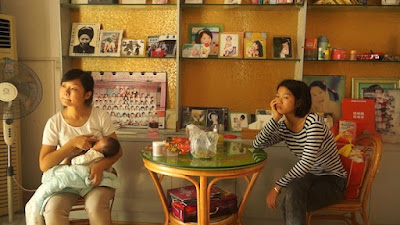The real villllains who made Wang Qiong’s family so miserable are never seen in her debut documentary. That would be the Chinese Communist Party that enacted and harshly enforced the notorious One Child Policy. The policy has been somewhat loosened in recent years, but the trauma it caused Chinese society will take generations to heal. Her family’s pain and guilt are as raw as ever, as Wang intimately documents in All About My Sisters, which opens today in New York.
Wang has two sisters, the elder Wang Li and the younger Zhou Jin. Arguably, the latter is lucky to be alive, but she doesn’t see it that way. Already having two daughters, technically one over the limit, their parents first tried to abort Zhou. When she was born anyway, they then abandoned her to her death, before remorse drove them to reclaim her. Still hoping to eventually have a son, they foisted her off on Wang’s aunt and uncle, whom Zhou assumed were her parents throughout her early childhood.
Incidentally, Wang’s other uncle was the village official primarily tasked with enforcing the One Child policy, through scorched earth techniques. Eventually, Zhou learned the truth of her origins, but she never really considered Wang’s parents to be her parents—and they are all keenly aware of it. Indeed, they immediately fall into their regular pattern of guilt-tripping and disapproving finger-wagging whenever they are together. Often, Wang segues from documenter to documented, as she tries mediate between Zhou and the rest of the family.
All About My Sisters so uncomfortably tragic, it is often nearly unbearable to watch. Yet, it is hard to pass judgment against Wang’s parents for the mistakes they made, because they were caught up in a rotten system, of the CCP’s perverse design. Millions of infant girls were abandoned to their deaths and millions more were aborted for reasons of gender selection. Wang’s parents were some of the few who tried to undo some of the horrors, at least to some extent.






